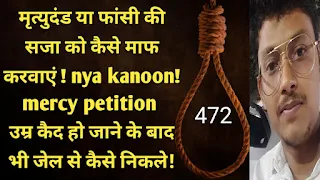What do you mean by a mercy petition and where is it addressed in the new law? How is the mercy petition of the Bharatiya Nagarik Suraksha Sanhita Act 2023 related to the Indian constitution?
In this post we talked about mercy petition-
Mercy:- Mercy means granting pardon to any person accused of an offense or offenses after their guilt has been confirmed.
The act of being kind or forgiving to someone who could be treated harshly, or helping people in a bad situation.
Petition:- Petition means any application for request in written form.
A formal written request made to an authority or organized body (such as a court).
Mercy petition:- A formal written request made to an authority for pardon.
A mercy petition is a formal request to a government for clemency or leniency in punishment. In the context of the Bharatiya Nagarik Suraksha Sanhita Act 2023, which I'm assuming is a fictional law you're referring to, a mercy petition might be a request made by an individual or a group to the government seeking mercy or leniency under the provisions of that law.
As for the relationship between the mercy petition under this fictional law and the Indian Constitution, it would depend on the specifics of the law. Generally, the Constitution of India provides for the power of the President and the Governor to grant pardons, reprieves, respites, or remissions of punishment or to suspend, remit or commute the sentence of any person convicted of any offense. These powers are outlined in Articles 72 and 161 of the Indian Constitution, respectively.
If the Bharatiya Nagarik Suraksha Sanhita Act 2023 includes provisions related to the President's or Governor's powers regarding mercy petitions, it would need to be in accordance with the Constitution and cannot contravene its provisions.
Now we will discuss Mercy petition as per law .
Section 472 of bnss talks about Mercy petition and its process.
When is mercy petition filed? And it's procedure?
When court punished accused for death penalty and no other or others option to approach to the court like review SLP, appeal. Then accused Person who has been punished for death filled Mercy petition or application to governor within 30 days of judgement if governor diminishing the Mercy petition(Article 161)then accused Person filled Mercy petition or application to president of India for pardon (Article 72) within 60 days of order of governor.
Section 472 of bnss - (1) A convict under the sentence of death or his legal heir or any other relative may, if he has not already submitted a petition for mercy, file a mercy petition before the. President of India under article 72 or the Governor of the State under article 161 of theConstitution within a period of thirty days from the date on which the Superintendent of thejail,—
(i) informs him about the dismissal of the appeal, review or special leave to
appeal by the Supreme Court; or
(ii) informs him about the date of confirmation of the sentence of death by the High Court and the time allowed to file an appeal or special leave in the Supreme Court has expired.
(2) The petition under sub-section (1) may, initially be made to the Governor and on its rejection or disposal by the Governor, the petition shall be made to the President within a period of sixty days from the date of rejection or disposal of such petition.
(3) The Superintendent of the jail or officer in charge of the jail shall ensure, that every convict, in case there are more than one convict in a case, also files the mercy petition within a period of sixty days and on non-receipt of such petition from the other convicts, Superintendent of the jail shall send the names, addresses, copy of the record of the case and all other details of the case to the Central Government or the State Government for consideration along with the said mercy petition.
(4) The Central Government shall, on receipt of the mercy petition seek the comments of the State Government and consider the petition along with the records of the case and make recommendations to the President in this behalf, as expeditiously as possible, within a period of sixty days from the date of receipt of comments of the State Government and records from Superintendent of the Jail.
(5) The President may, consider, decide and dispose of the mercy petition and, in case there are more than one convict in a case, the petitions shall be decided by the President together in the interests of justice.
(6) Upon receipt of the order of the President on the mercy petition, the Central Government shall within forty-eight hours, communicate the same to the Home Department of the State Government and the Superintendent of the jail or officer in charge of the jail.
(7) No appeal shall lie in any Court against the order of the President or of the Governor made under article 72 or article 161 of the Constitution and it shall be final, and any question as to the arriving of the decision by the President or the Governor shall not be inquired into in any Court.





.jpg)